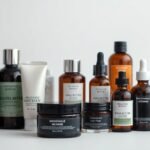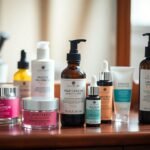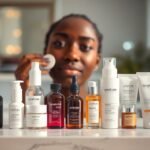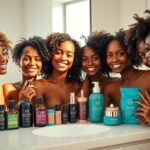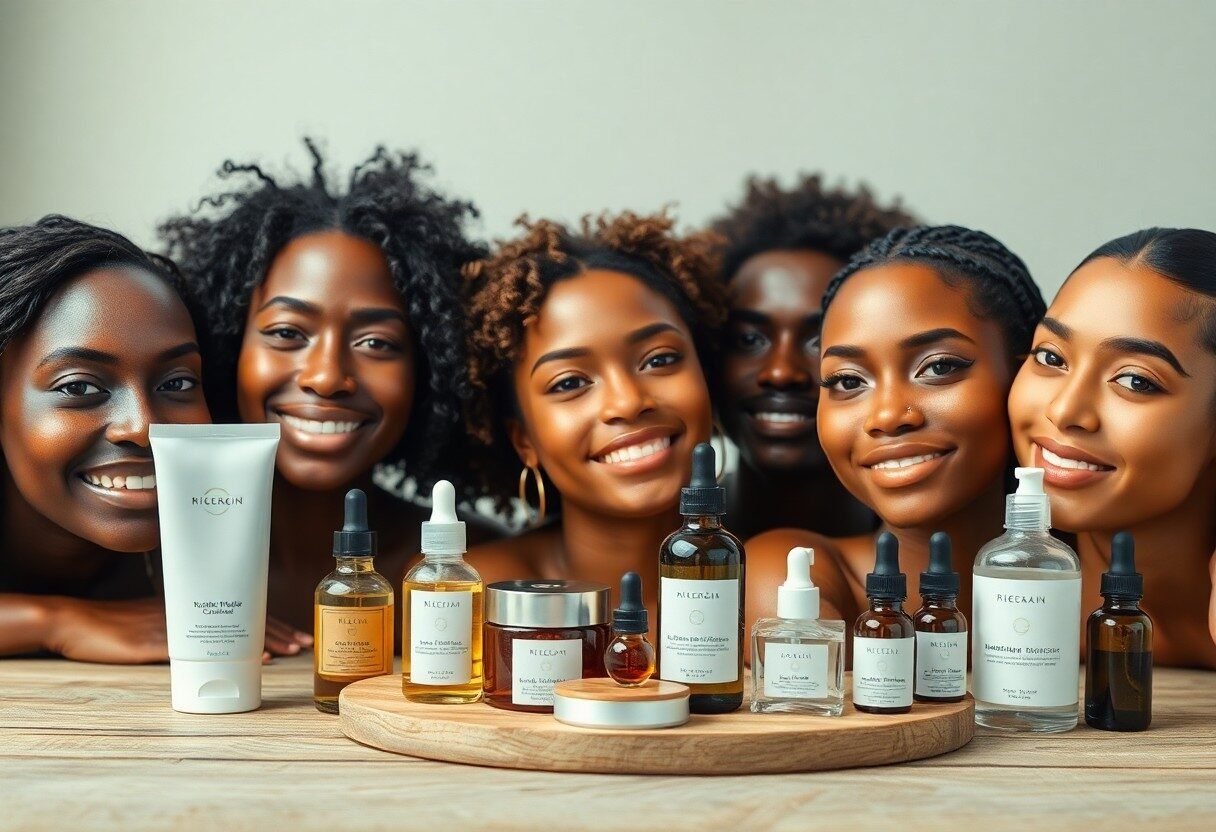
There’s a unique beauty to African American skin that requires specific attention and care. As I investigate into the needs of our skin, it’s important to recognize the different challenges we face, including , , and . Choosing the right skincare products can make all the difference, enhancing your natural glow while addressing these specific concerns. In this post, I’ll share insights into what you need to consider for your skincare routine, helping you make informed choices that promote healthy, radiant skin.
Key Takeaways:
- African American skin often has unique characteristics such as higher levels of melanin and a tendency towards dryness, which influences the choice of skincare products.
- Hydration is crucial; look for products containing ingredients like glycerin and hyaluronic acid to retain moisture effectively.
- Exfoliation is important, but should be done gently; consider using chemical exfoliants like AHAs and BHAs over harsh physical scrubs.
- Sunscreen is critical for all skin types, including deeper skin tones; SPF should be a part of the daily skincare routine to prevent hyperpigmentation.
- Products formulated with natural oils, such as jojoba or argan oil, can help nourish and protect African American skin.
- Address specific concerns like hyperpigmentation or acne with targeted treatments, such as serums containing vitamin C or niacinamide.
- When choosing skincare, look for labels that are specifically tailored for melanin-rich skin, ensuring compatibility with its unique needs.
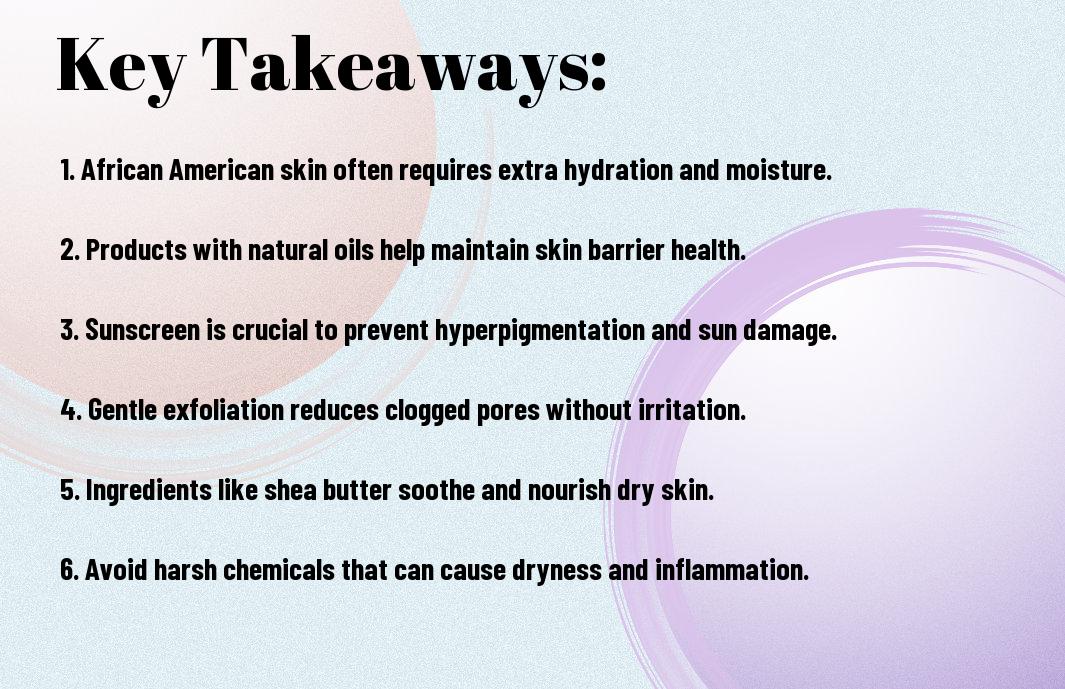
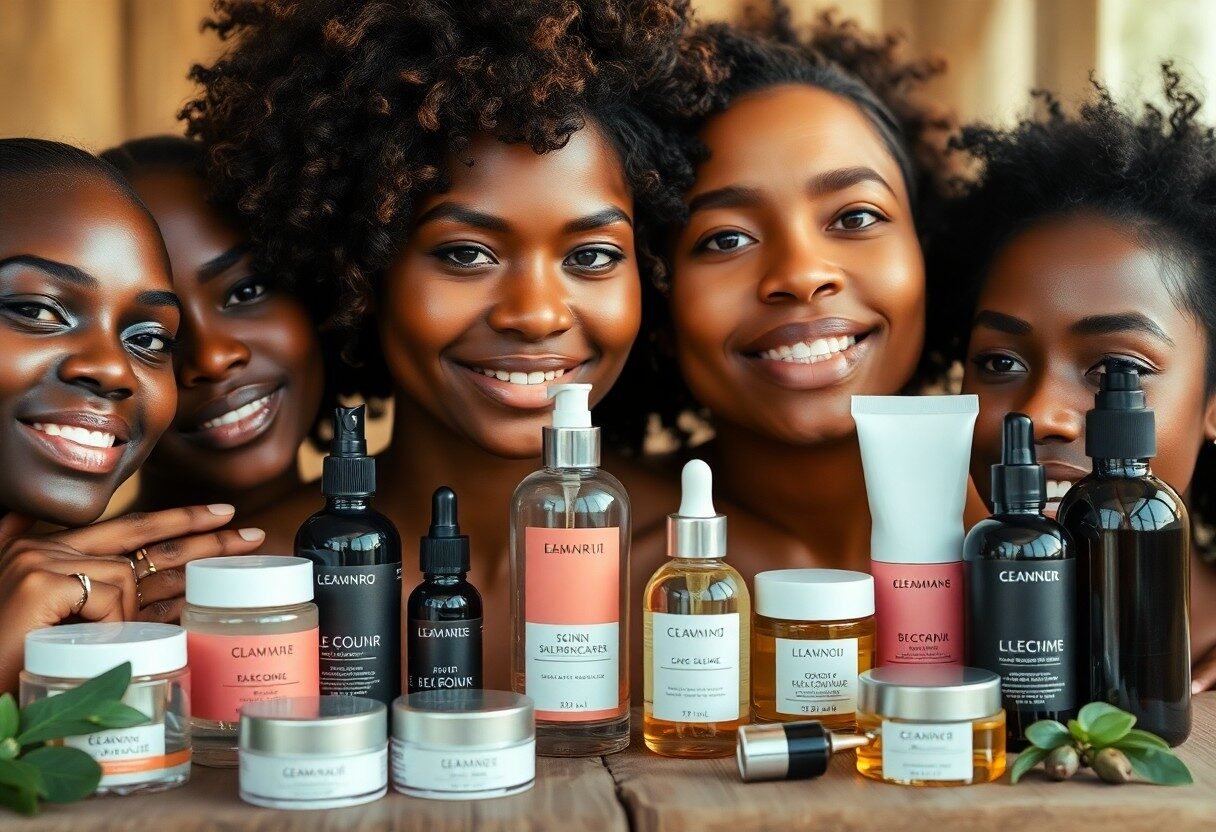
The Unique Characteristics of African American Skin
Diversity in Skin Types and Tones
African American skin encompasses a vast array of skin types and tones, ranging from deep browns to lighter shades of caramel. This diversity is due to the rich history and genetic variations within the African American community. Each individual’s skin may display unique characteristics, including different levels of oiliness, sensitivity, and overall texture. Understanding these variations helps in selecting the right skincare products that cater to individual needs. The
| Skin Type | Description |
| Oily | Shiny appearance with larger pores, prone to acne. |
| Dry | Rough texture, often feels tight, may show signs of flakiness. |
| Combination | Mixed areas of oiliness and dryness, typically T-zone is oilier. |
| Sensitive | Reactive to products and environmental changes, may develop rashes. |
| Normal | Balanced skin, not too oily or dry, may have few imperfections. |
Common Skin Concerns in African American Individuals
One prevalent concern often arises with hyperpigmentation, which affects a substantial number of people. In my experience, this can stem from acne scarring, sun damage, or hormonal changes. Additionally, dryness and itchiness are common, primarily due to environmental factors or lack of moisture retention. You may also encounter an increased likelihood of keloids, which are raised scars that form during the healing process. Awareness of these concerns aids in adopting suitable skincare practices.
The Science Behind Melanin and Skin Health
The Protective Role of Melanin
Melanin plays a vital role in protecting skin from harmful effects of UV radiation. The pigment absorbs UV rays and minimizes their penetration into the skin, which reduces the risk of sunburn and skin cancers. In African American skin, increased melanin production contributes to a natural defense mechanism against environmental stressors, offering a layer of protection that lighter skin tones may not possess as effectively.
Implications of Melanin for Skincare Regimens
This natural protection from melanin does not eliminate the need for a comprehensive skincare regimen. Instead, it emphasizes the importance of maintaining skin health through products that enhance melanin’s benefits. For example, African American skin may be prone to specific concerns such as hyperpigmentation and ashy dryness, which require targeted treatments that acknowledge melanin’s role in skin conditions.
In my experience, it’s necessary to seek out products that cater specifically to the nuances of melanin-rich skin, especially considering common issues like post-inflammatory hyperpigmentation. Ingredients such as vitamin C can help brighten the complexion while managing uneven skin tone. Additionally, incorporating gentle exfoliants can promote skin cell turnover without compromising the protective melanin layer. Prioritizing hydrating formulations is also key, as richly moisturized skin enhances the skin barrier while reducing dryness and flakiness. Understanding how melanin influences various skin conditions allows for tailored approaches that truly meet your unique needs.
The Importance of Hydration: Moisturizers for African American Skin
Identifying Suitable Ingredients
Opt for moisturizers that feature rich, hydrating ingredients such as shea butter, jojoba oil, and hyaluronic acid. These components not only nourish but also create a protective barrier that locks in moisture. For those with sensitive skin, avoiding products with harsh chemicals or artificial fragrances can help maintain the skin’s natural balance. Additionally, incorporating ingredients like glycerin can attract moisture, enhancing your skin’s hydration levels.
Best Practices for Hydration in Skincare
Establishing a consistent hydration routine is fundamental. Start with a gentle cleanser to avoid stripping your skin of its natural oils, and follow up with an effective moisturizer. Applying hydrating products while your skin is still damp can significantly boost absorption. Utilizing oils, especially at night, can help seal in that moisture for long-lasting hydration. These strategies can also mitigate the chances of experiencing dryness and flakiness.
To further enhance hydration, consider using a humidifier in your living space to maintain moisture levels in the air, especially during dry seasons. Additionally, drinking adequate water throughout the day supports overall skin health from the inside out. Personalize your hydration approach by paying attention to how your skin reacts to different products and environmental conditions. Doing this allows you to fine-tune your skincare routine, ensuring optimal hydration tailored to your unique skin needs.
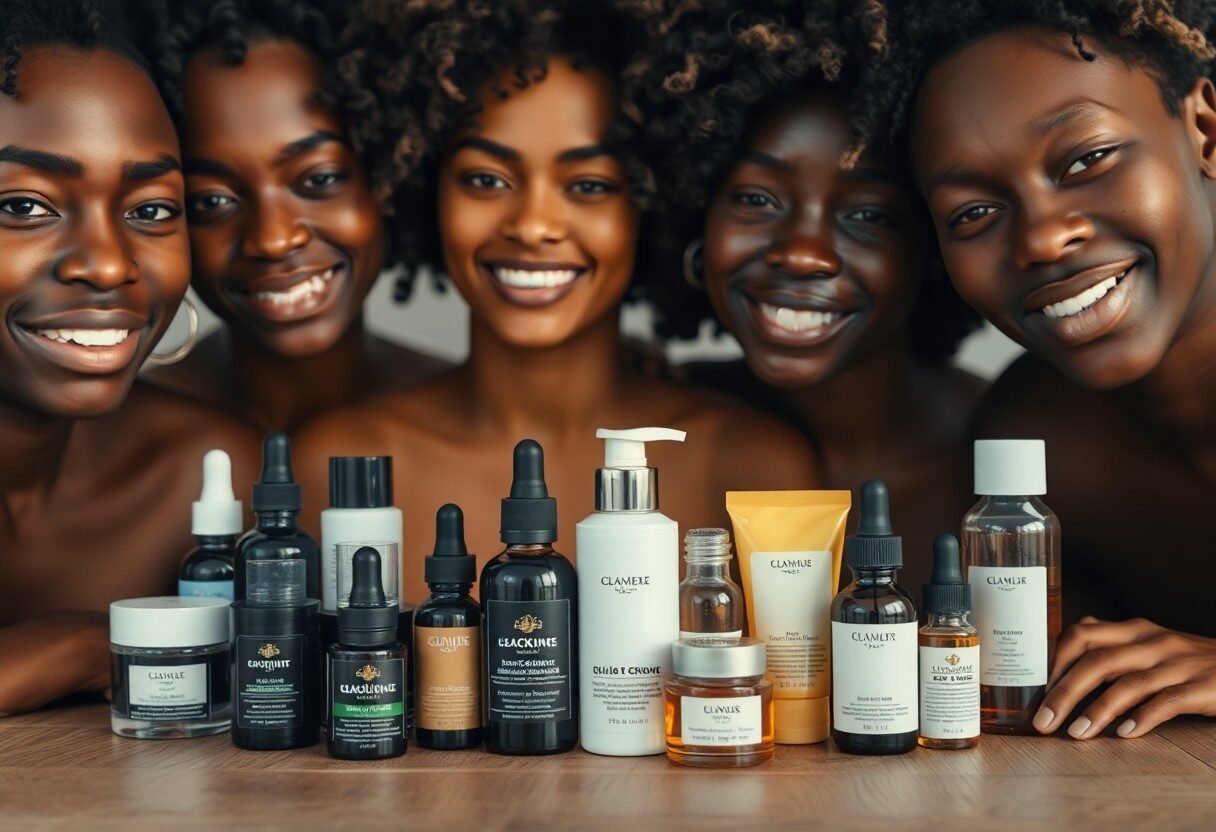
Addressing Hyperpigmentation and Dark Spots
Causes of Hyperpigmentation in African American Skin
Hyperpigmentation in African American skin often results from a combination of factors, including sun exposure, inflammation, and hormonal changes. Increased melanin production in response to skin trauma, such as acne or eczema, can lead to dark spots. Additionally, certain medications or systemic health issues may influence pigmentation. Understanding these root causes is necessary, as they foster targeted interventions for effective treatment.
Recommended Products and Treatments
To combat hyperpigmentation, consider serums and creams containing ingredients such as vitamin C, kojic acid, and niacinamide. These components work by inhibiting melanin production and promoting an even skin tone. Exfoliating acids, like glycolic and salicylic acids, can help shed layers of dead skin and enhance product absorption. For persistent dark spots, professional treatments, including chemical peels and laser therapies, may provide significant improvement.
Incorporating these recommended products into your skincare regimen can yield transformative results. For instance, a vitamin C serum not only assists in reducing dark spots but also boosts collagen production for improved skin texture. Kojic acid helps to inhibit the enzyme responsible for melanin production, often giving visible differences in just a few weeks. Additionally, the combination of exfoliating acids can prepare your skin to absorb treatments more effectively, ensuring that active ingredients penetrate deeply and provide the best possible outcome. Regular use of these products can lead to a noticeably brighter and more uniform complexion over time.
The Role of Sunscreen in Melanin-Rich Skin Care
Debunking Myths About Sunscreen Usage
Many believe that those with melanin-rich skin do not need sunscreen, perpetuating the myth that darker skin is immune to sun damage. In truth, while melanin does offer some innate protection against UV radiation, it does not eliminate the effects of sun exposure. Skin can still burn, age prematurely, and develop conditions like hyperpigmentation and skin cancer. It’s vital to apply a broad-spectrum sunscreen to safeguard your skin.
Types of Sunscreens to Use and Avoid
Selecting the right sunscreen involves understanding the ingredients that work best for your skin type. I recommend opting for mineral-based sunscreens containing zinc oxide and titanium dioxide, as they provide broad-spectrum protection without irritating sensitive skin. Avoid chemical sunscreens with oxybenzone and avobenzone, as these can potentially cause adverse reactions. Always read ingredient labels closely.
| Preferred Ingredients | Avoid |
| Zinc Oxide | Oxybenzone |
| Titanium Dioxide | Avobenzone |
| Mineral-based Formulas | Fragrance-Heavy Products |
| Broad Spectrum SPF 30+ | Alcohol-Based Formulas |
Utilizing the right type of sunscreen is vital for maintaining the health of melanin-rich skin. I recommend looking for broad-spectrum SPF 30 or higher that contains physical blockers like zinc oxide and titanium dioxide. These ingredients offer effective protection while being less irritating than their chemical counterparts, which may cause breakouts or reactions on sensitive skin types. Additionally, staying away from alcohol-based products and those laden with fragrances ensures that your skin remains hydrated and irritation-free. Recognizing the right formulations will help keep your skin looking even and healthy.
- Choose mineral-based sunscreens for effective protection.
- Avoid chemical sunscreens that may irritate your skin.
- Opt for broad-spectrum SPF 30+ for optimal defense.
- Stay clear of alcohol-based products that can dry out skin.
- Recognizing what works best is key to maintaining healthy skin.
Anti-Aging Strategies Tailored for African American Skin
Common Signs of Aging to Watch For
As I observe changes in my skin, I notice that fine lines often begin around the eyes and mouth, followed by sagging skin. Hyperpigmentation can also become more pronounced, appearing as dark spots from sun exposure or hormonal changes. Additionally, a dull complexion might emerge, indicating decreased skin cell turnover. Recognizing these signs early allows for more effective interventions.
Effective Ingredients to Combat Aging
To effectively address the signs of aging, I focus on powerful ingredients like retinoids, peptides, and antioxidants. Each plays a unique role in rejuvenating and maintaining the skin’s youthful appearance.
Retinoids, derived from Vitamin A, are renowned for their ability to promote cell turnover and improve collagen production, minimizing the appearance of fine lines and enhancing skin texture. Peptides are crucial for supporting the skin barrier and stimulating collagen synthesis, making them ideal for restoring firmness. Antioxidants, such as Vitamin C and E, not only protect against oxidative stress but also brighten and even out skin tone, countering the effects of hyperpigmentation. Incorporating these ingredients into a daily skincare routine can yield remarkable results in maintaining a youthful, radiant complexion.
Navigating Acne and its Aftermath
Differences in Acne Presentation for African Americans
Acne in African American skin can often manifest differently compared to other skin types. While you might expect the classic red pimples, I’ve noticed that African Americans frequently experience post-inflammatory hyperpigmentation (PIH). This can result in dark spots or discoloration that linger long after the actual acne has faded. Additionally, instead of the typical pustular acne, I often see raised, hard lesions known as keloids, which can complicate your journey toward clear skin.
Treatment Options and Preventative Measures
With respect to treating acne and preventing future outbreaks, a multifaceted approach tends to yield the best results for African American skin. Options range from topical treatments containing salicylic acid or benzoyl peroxide to prescription medications like retinoids. Incorporating products with ingredients such as azelaic acid can help reduce inflammation and combat hyperpigmentation. Additionally, I recommend using non-comedogenic moisturizers and sunscreens to protect your skin without triggering breakouts.
For best results, formulating a personalized regimen is key. Start with gentle cleansers to avoid irritating your skin, as irritation can exacerbate both acne and the potential for hyperpigmentation. Active ingredients should be introduced gradually to allow your skin to adjust. Regular exfoliation can also play a role in preventing clogged pores while ensuring any dark marks fade effectively. I’ve found that consulting with a dermatologist focusing on your unique skin type can lead to a tailored treatment plan that not only targets present blemishes but also minimizes any risk of future flare-ups or scarring.
Tips for Building an Effective Skincare Routine
Creating a skincare routine that meets the specific needs of African American skin can significantly enhance its health and appearance. Here are some effective tips to consider:
- Invest in a quality cleanser to remove impurities without stripping moisture.
- Incorporate a moisturizer formulated for your skin type to maintain hydration.
- Use a sunscreen with at least SPF 30 daily, regardless of the weather.
- Consider products with anti-inflammatory ingredients to combat issues such as hyperpigmentation.
- Stay consistent with routine, as it may take time to notice visible changes.
Perceiving the individual variations in skin types among African Americans is vital for crafting a personalized regimen.
Essential Steps for Daily Care
Daily skincare begins with cleansing to remove dirt and oil, followed by toning to refresh and balance the skin’s pH. A good moisturizer, specifically designed for your skin type, is vital to lock in hydration. Lastly, don’t skimp on broad-spectrum SPF to protect against UV damage, which can exacerbate issues like dark spots.
Tailoring a Routine to Individual Skin Needs
Your skincare approach must reflect your unique skin type—be it oily, dry, or combination. Understanding your skin’s needs is key to selecting the right products.
I’ve found that not all skincare products work universally. For instance, if you have oily skin, gel-based moisturizers may be ideal, while those with dry skin might benefit more from cream-based products. I always look at ingredient labels, seeking out elements like hyaluronic acid for hydration and niacinamide for oil control. Testing products to see how my skin reacts has led me to discover what works best for me. This individualized method can help you achieve your optimum skin health goals.
Final Words
Following this exploration of African American skin needs, I hope you feel more equipped to select skincare products that cater to your unique complexion. By understanding the distinct characteristics of your skin, such as oiliness, dryness, and pigmentation concerns, you can make informed choices. Look for products rich in hydrating ingredients, antioxidants, and vitamins to address these specific needs. Your skincare routine should not only enhance your skin’s health but also celebrate its beauty. Embrace your journey, and let your skin reflect your individuality.
Frequently Asked Questions about Understanding the Needs of African American Skin – Skincare Products to Consider
Q: What are the unique characteristics of African American skin?
A: African American skin often has a higher melanin content, which provides some natural protection against UV rays, but it is also worth noting that this skin type can be more prone to certain conditions such as hyperpigmentation and keloid scarring. The skin may also be drier due to a lower production of natural oils and can exhibit a range of textures, from very oily to quite dry. Understanding these characteristics is key in selecting the right products.
Q: Why is moisture important for African American skin?
A: Moisture plays a vital role in maintaining the health of African American skin. Due to its unique structure, this skin type can sometimes struggle with dryness, which may lead to flakiness or irritation. Utilizing moisturizers that include ingredients such as shea butter, cocoa butter, and glycerin can aid in providing and locking in necessary hydration, making skin appear smoother and more radiant.
Q: Which ingredients should I look for in skincare products for African American skin?
A: When dicking out skincare products, it’s crucial to choose formulations that are rich in antioxidants and hydrating agents. Ingredients such as hyaluronic acid, vitamin E, and aloe vera are beneficial. Additionally, for catering to specific concerns like hyperpigmentation, look for products containing vitamin C or licorice root extract, which can help in evening out skin tone.
Q: Are there specific products recommended for dealing with hyperpigmentation?
A: Yes, addressing hyperpigmentation, a common concern, can be effectively managed with products that include retinoids, benzoyl peroxide, and glycolic acid. These ingredients can promote cell turnover, helping to fade dark spots. Additionally, sunscreen is crucial, as it protects against UV rays that can exacerbate pigmentation issues.
Q: How can I determine if a product is suitable for my skin type?
A: To determine the suitability of a skincare product, consider your specific skin type (oily, combination, dry, or sensitive) and any particular concerns you have. Always check the ingredient list for potential irritants and look for formulations labeled as “non-comedogenic” if you’re prone to acne. Patch testing a product on a small area of skin can also help gauge how your skin reacts prior to full application.
Q: Is it necessary to use sun protection, and what kind is best for African American skin?
A: Sun protection is crucial for all skin types, including African American skin, as sun exposure can lead to skin damage and worsen hyperpigmentation. A broad-spectrum sunscreen with at least SPF 30 is recommended. Consider a formula that’s hydrating but not greasy to suit the needs of your skin type, and choose one with a matte finish if you have oily skin.
Q: Can dietary choices impact the health of African American skin?
A: Absolutely, dietary choices can significantly influence the health and appearance of your skin. Consuming foods that are rich in Omega-3 fatty acids, antioxidants, and vitamins can support skin health. Foods such as fatty fish, nuts, fruits, and vegetables help keep skin hydrated and may improve overall skin tone. Staying hydrated by drinking plenty of water is equally important.
